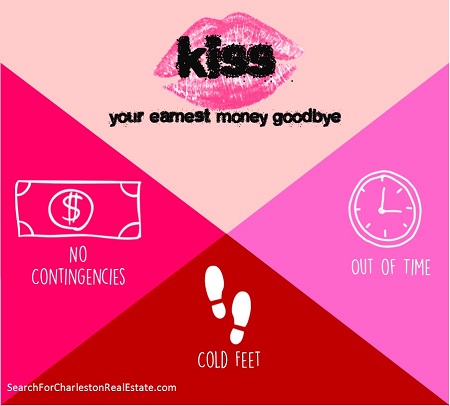How to Lose Your Earnest Money
Posted by Lee and Katherine Keadle on Monday, January 30th, 2017 at 9:55am.

So you’ve found the perfect home to buy and are getting ready to make an offer with your Realtor. She explains to you that you’ll need to include an earnest money deposit with your contract to purchase, and this amount is usually 1% of the offer price. Before pulling out your checkbook, you should understand that this deposit will go towards the amount you pay at closing. In South Carolina, this money sits in an escrow account, usually with your Realtor’s company, until the closing is ready to take place. However, there are 3 ways you can lose this money (meaning the seller gets to keep the entire amount). Pay attention so that you can ensure every dollar comes back to you on closing day!
Your Offer Included No Contingencies
A real estate contingency is a clause that gives you an escape route if something specific happens once you’re under contract. For example, the most common one we see is a financing contingency. If this is included in your paperwork, it means that you’re obligated to purchase the home unless the bank refuses to give you a mortgage. Sometimes buyers go through the pre-approval process with a lender and are told they can purchase a home up to X dollar amount. However, when the underwriter reviews the information the week before closing, the buyer might get denied for a loan even though he did everything the lender told him to do. Because the buyer is not at fault – and more importantly, because his Realtor included a financing contingency – the buyer will get his earnest money back in its entirety.
Another common contingency or protection is for the inspection. In this case, if the buyer were to find a myriad of problems with the home (such as structural issues, termite damage, water entry, etc) that the seller was unwilling to fix, the buyer can get his money back and move on to another home that is hopefully in better condition.
If contingencies are such an easy way out for the buyer, you might ask why Realtors don’t include a list of these in every contract. The answer is negotiating power. If a seller sees too many ways out for the buyer, he’ll question whether this is really worth taking the home off the market. Particularly in a multiple offer situation, the seller will choose the offer that is mostly likely to go to the closing table. Imagine two offers – one that is contingent on financing, sale of the buyer’s current home, inspection, and appraisal. The other offer is a cash deal that is written cleanly with no contingencies.
Even if the cash deal is a lower price, the seller will probably accept it because it is most likely to result in a closing.
You Let Your Time Run Out
You’ll see the phrase “Time is of the essence” throughout real estate contracts. Offers generally include dates by which the inspection, mortgage pre-approval, and other important events should take place. Even if you have an inspection contingency, if you don’t follow the timeline that you and the seller both agree to in the contract, you could lose your earnest money. This is why it’s important to talk with your Realtor about realistic time frames for these items. Right now with the strong Charleston real estate market, we’re finding that it takes longer to get inspectors and contractors into a home because they are so slammed with their work loads. Your real estate agent will guide you through this process and will have good backup options for getting your ducks in a row within the allotted time frame.
You Decide Not to Purchase

It rarely happens since the point of an earnest money deposit is to ensure the buyer has some skin in the game while the seller takes his home off the market for 30-45 days. However, sometimes buyers get cold feet or change their minds about a property. In this case, there’s no argument for the buyer. The seller keeps the deposit in hopes that it will make up for losses incurred while the home was off the market (mortgage payments, repairs made at the expense of the seller, and most importantly the lost marketing time that could have resulted in a successful sale).
Before you make a real estate offer to purchase, it’s so important to talk with your agent so that you understand your obligations and the circumstances under which you can lose your earnest money deposit. She’ll be able to answer any questions you have, and she’ll also be sure to include the right contingencies in your paperwork based on your individual needs.


